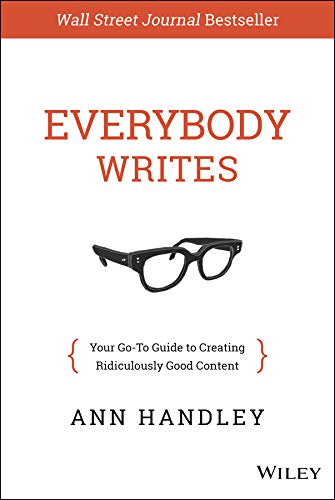This post is part of the 📖 Everybody Writes series.
Today I am reading Chapter 38 of the book Everybody Writes written by Author Ann Handley.
Chapter 38
Learn Words You’re Probably Misusing or Confusing with Other Words
Some words seem interchangeable with others because they sound similar, others because their meanings are confused in everyday usage.
Disinterested: impartial or unbiased Uninterested: don’t care
Accept: agree to receive, as in “Joakim Noah Reluctant to Accept Praise.”
Except: not including (or excluding), as in “Two Charts That Will Enrage Everyone (Well, Except Bankers).”
Historic: having importance in history. Historical: having taken place in history or otherwise in the past.
The book contained a lot of examples in this section and is not practical or ethical for me to provide all the examples here.
The book is worth reading just for this chapter alone.
Usage Confusion
Fewer versus less. Use less in relation to a single, noncountable item and fewer in relation to more than one countable item. So, a good shortcut: if you can count the thing you’re referring to, use fewer. For example, The couch has less fur on it now that I have fewer dogs.
They’re versus their versus there
There is a place, either actual or nonspecific. They’re happy people because they have their whiskey over there. (Easy usage hack: there looks like where—as in place.)

Do you know you can listen to this book on Amazon Audible for FREE?
If you are not into reading like me, then you can listen to this book for FREE on Amazon Audible
Don't Read. Just 🎧Key Takeaways
I always confused with the usage of who versus whom. After reading this chapter, I picked up a good tip.
Here’s the tip.
A good grammar hack is to substitute he and him to see whether you should use who or whom; he would pair with who, and him (ends in m) would pair with whom (ends in m).
For example, if you can’t decide between whom do you love or who do you love, substitute he and him and rearrange the words. For example, should it be him do you love (or, do you love him) or he do you love (or, do you love he). In this case, you should use whom.
Summary
While reading the book, take plenty of notes and stick next to your desk. Last few chapters (34, 35, 36, 37 and 38) made me believe my investment in this book (time and money) are worth buying the book.
Highly recommend the book as your goto book as it constitutes of plenty of reference points. The book is a collection of monuments (like a museum of English usage) all at one place.
I am going to reread a few chapters as I feel like to immerse myself in the material.
I am loving it.
If you read and understand the excellent practical and easy implementable material in this book, it will surely transform your writing and business alike.
What are you waiting? Go and buy and transform your writing for good forever.
Author(s): Ann Handley
Part 18 of 35 in the 📖 Everybody Writes book series.
Series Start | Everybody Writes - Day 17 | Everybody Writes - Day 19
